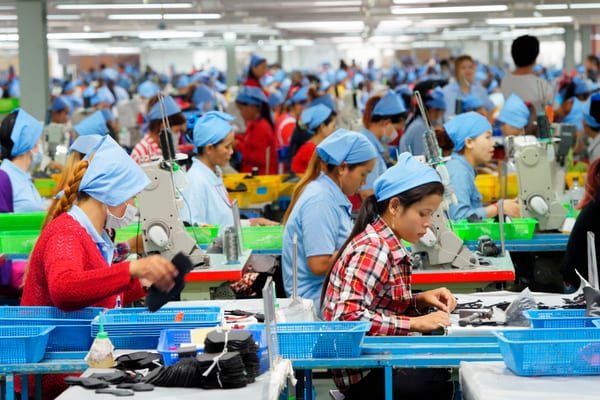Recruitment Practices Must be Part of Sustainable Development Strategies
13 December 2016

One in every 17 workers is a migrant worker. Their efforts are a ubiquitous feature of all global supply chains. There is little that we eat, wear or use that has not seen the involvement of migrant workers at some stage of its production.
Migrant workers also feature prominently in the many service industries upon which developed economies have come to depend, such as cleaning, hospitality and care. The labour of migrant workers is therefore a considerable factor in boosting global economic growth. For some countries, the remittances sent home by migrant workers constitute a considerable proportion of GDP. For instance, nearly 30% in the case of Nepal, according to World Bank figures.
The reasons people move for work are clearly not merely financial.
The earning potential of work abroad and money remitted or saved can enable many families to feed and educate their children, to purchase land or to establish businesses. Nor should we forget other advantages of migrating for work. The social gains, the experience, the chance to learn new skills and languages, the ability to see and take part in other communities and cultures – all are invaluable for individuals and broader society. For many younger people, work abroad is an opportunity to engage with a seemingly more attractive modern world away from constraining orthodoxies. For many women, it is the opportunity to escape from the drudgery of domestic work, family obligations and patriarchal societies. The reasons people move for work are clearly not merely financial.
But despite the benefits, we cannot forget that many migrant workers face a unique set of challenges. For low waged workers in particular, migrant status, as well as language, racial and cultural barriers, increase vulnerability to exploitation. For many workers, the payment of large recruitment fees to secure employment abroad traps them in situations of debt bondage, making them vulnerable to further exploitation, including forced labour.
In September 2016, the UN staged the first Summit for Refugees and Migrants, seen as an opportunity to respond more responsibly to the large global movement of people in ways that would respect rights and promote development. And just this week at the annual Global Forum on Migration and Development - this year taking place in Dhaka Bangladesh - the difficulties faced by migrant workers in securing their basic rights was once more top of the agenda.
The issue of recruitment fees and their adverse impacts on rights and development is gaining attention. On the surface, the headline figures for GDP in the form of remittances seem attractive and a boon to development, but where is much of that money ending up?
The issue of recruitment fees and their adverse impacts on rights and development is gaining attention. On the surface, the headline figures for GDP in the form of remittances seem attractive and a boon to development, but where is much of that money ending up?
For many workers, the payment of large recruitment fees – even time spent working at a good employer under good conditions abroad – will see them lose a large percentage of their earnings to recruiters and labour brokers. Significantly, this often results in a flight of money away from rural villages where it is most needed to urban centres where recruitment agencies operate. It will also mean a significant portion of migrant worker earnings that may have been planned for remittances to home countries remaining instead in the country where the work was undertaken – in the form of fees to destination country recruitment agents and kickback payments and bribes to hiring managers.
And to make matters worse, migrant workers too often find themselves in employment situations where their earning potential is considerably less than they were promised. Servicing recruitment debt compounds this reduction in income and can actually push migrants into negative equity. Flawed recruitment practices therefore are not only exploitative, but they considerably erode development benefits.
Reflecting the Dhaka Principles for Migration with Dignity, the Employer Pays Principle is a commitment to ensure that no worker should pay for a job – the costs of recruitment should be borne not by the worker but by the employer.
Changing the recruitment business model is fundamental to both prevent exploitation and meet the objectives set by the UN Sustainable Development Goals. Reflecting the Dhaka Principles for Migration with Dignity, the Employer Pays Principle is a commitment to ensure that no worker should pay for a job – the costs of recruitment should be borne not by the worker but by the employer. It is endorsed by the Leadership Group for Responsible Recruitment, a collaboration between expert organisations and leading companies – including including The Coca Cola Company, HP Inc., Hewlett Packard Enterprise, IKEA, M&S, Walmart and Unilever – driving positive change in the way that migrant workers are recruited.
Adoption of this simple principle is the first step to unlocking the true potential of work abroad.




